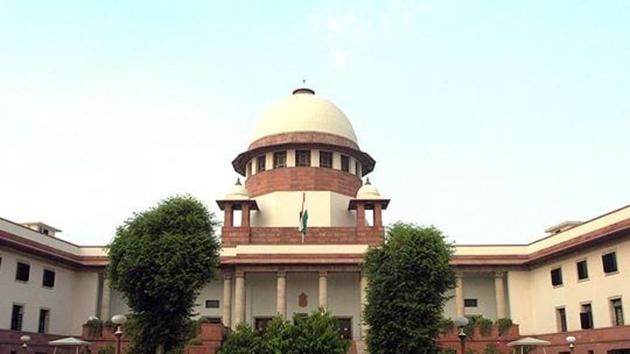Should Chief Justice’s office be under RTI ambit? Supreme Court to hear plea
In 2010, a three-judge bench of the Delhi High Court comprising justices AP Shah, Vikramjit Sen and S Murlidhar had held that the office of the CJI is a “public authority” and hence it comes under the RTI Act.
A five-judge constitution bench of the Supreme Court will assemble this week to hear arguments in five different cases, including the one on whether the Chief Justice of India’s office is covered under the transparency law, the Right to Information Act (RTI).

In 2010, a three-judge bench of the Delhi High Court comprising justices AP Shah, Vikramjit Sen and S Murlidhar had held that the office of the CJI is a “public authority” and hence it comes under the RTI Act.
The judgment was challenged in the Supreme Court and for the last nine, years there has been a stay on it.
A similar five-judge bench had last year dealt with eight important matters, including the one on the Aadhaar law, the validity of section 377 of the Indian Penal Code that criminalised the consensual gay sex, and the restriction on the entry of women into Sabarimala. The hearings culminated in path-breaking verdicts in October last year, just before then CJI Dipak Misra’s retirement.
The question over whether the top court comes under the RTI Act was referred to a constitution bench in 2017. The three-judge bench that made the reference was headed by Justice Ranjan Gogoi, the current Chief Justice of India. Central Public Information Officer of the top court is in appeal before the SC in this case. The petition is against a 2010 Delhi High Court verdict that ruled the highest court was bound to disclose information under the RTI Act. The HC ruling came on a petition filed by RTI activist SC Agarwal.
The top court had stayed the operation of the judgment while admitting the appeal. The bench had then said: “RTI Act merely recognises the constitutional right of citizens to freedom of speech and expression. Independence of judiciary forms part of basic structure of the Constitution. The independence of judiciary and fundamental right to free speech and expression are of a great value and both are required to be balanced. The current debate is a sign of a healthy nation.
This debate on the Constitution involves great and fundamental issues.” The other important case listed before the top court raised the question whether lawmakers enjoy immunity from prosecution for taking bribes at the time of casting their votes during the confidence/no-confidence motion or whenever it necessitates voting. A three-judge bench led by CJI Gogoi had last week referred the matter to a larger bench. However, it might eventually go to a seven-judge bench as a five-judge bench had earlier held that MPs and MLAs do enjoy immunity from legal proceedings for their legislative duties discharged as a lawmaker, including voting in Parliament or assembly.
The constitution bench will also deal with the controversial matter related to land acquisition law in which a three-judge bench was accused of overlooking an earlier ruling by a bench of the same strength. The issue is whether land acquisition proceedings by government or its instrumentalities would become invalid if the land owners failed to take the compensation amount.
While a three-judge bench had in 2014 ruled in favour of the land owners, the 2018 judgment held that acquisition proceedings would not lapse if the land owners do not take the compensation. The matter related to various provisions of the finance act would be taken up by the bench as it hears an appeal filed by the Madras Bar Association challenging the law relating to setting up of administrative tribunals in the country, their hierarchy and control.
Get Current Updates on India News, Lok Sabha election 2024 live, Election 2024 along with Latest News and Top Headlines from India and around the world.



